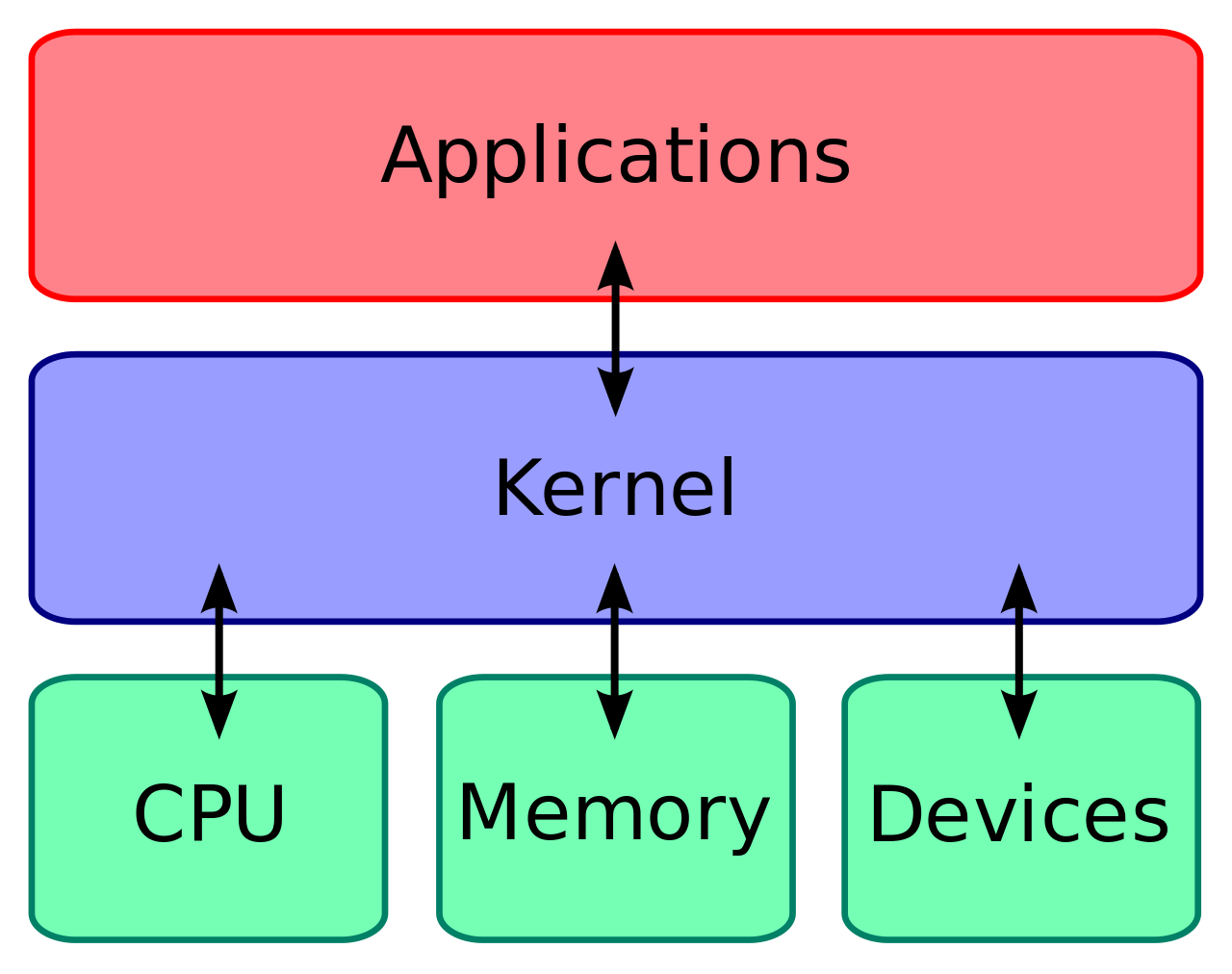Before we explain anything, please let me clear that stereotype from your mind that Linux is like Kali Linux,
which is used by dangerous hackers who break their keyboards while typing spells on their black screens.
 This is not what we mean when we mention Linux, So, what is Linux? In short, we should say what is GNU/Linux.
It is an open-source operating system where its users have the freedom to modify and change it
according to their will freely and without any risk to their privacy. Linux is essentially a kernel,
This is not what we mean when we mention Linux, So, what is Linux? In short, we should say what is GNU/Linux.
It is an open-source operating system where its users have the freedom to modify and change it
according to their will freely and without any risk to their privacy. Linux is essentially a kernel,
 which is a software program that controls how the computer behaves and manages both the hardware and software components of the computer.
which is a software program that controls how the computer behaves and manages both the hardware and software components of the computer.
It's like the conductor of an orchestra, making sure that all the different parts of the computer are working together harmoniously.
In this article, we will refer to GNU/Linux as Linux.
You may ask what is GNU ?
GNU stands for "GNU's Not Unix". It is a free, open-source operating system that was created by Richard Stallman in the 1980s as an alternative to proprietary software. The goal of GNU was to create a completely free operating system that would give users the freedom to use, modify, and distribute the software as they please.
The GNU Project is a collaborative effort to create a complete operating system composed entirely
of free software. GNU software is licensed under
Let's forget about all this complicated talk and simplify things a bit.
To understand Linux, we shouldn't think of it as a fixed unit like Windows or Mac, but it's more like different flavors of ice cream.
The base is the same, which is the ice cream, but the
flavors vary between chocolate, vanilla, and others. This ensures that you can find the flavor you want.
That's why I told you to forget the stereotype that some people have about Linux because they are only referring to one flavor of this ice cream, not all of them. Each flavor has its own unique features and fans.
that's where we come to know Linux distributions what are they ?
Linux distributions, often abbreviated as "distros," are variations of the Linux operating system that
are created by different groups or individuals. These variations can include differences
in pre-installed software, user interfaces, and system configurations, among other things.
Linux distributions are typically categorized based on their intended use or
target audience. For example, some distributions are designed for server use, while others are tailored for desktop or laptop use. Some popular Linux distributions include Ubuntu, Fedora, Debian, and CentOS, among many others.
 Each Linux distribution has its own set of unique features and characteristics,
Each Linux distribution has its own set of unique features and characteristics,
making it important to choose the right distribution based on your specific needs and preferences. Some distributions are designed to be lightweight and fast, while others prioritize
stability or security. Some distributions come with pre-installed software packages for
specific purposes like multimedia or gaming, while others focus on
providing a basic set of tools that can be customized by the user.
Some new users see Linux as that black screen with incomprehensible commands, and they think it's difficult and so on.
However, lately Linux has become more graphical, and in most scenarios, you won't have to deal with the terminal as a regular user. Also, I encourage learning the terminal
and commands because they are useful for you and more useful for understanding how the system works up close.
Most users think it's difficult because they haven't had experience learning a new operating system for years.
Most people have learned the workflow of some operating systems since childhood or for years, so it became natural for them. But I assure you that it will be a fun learning journey. Additionally, we must mention the elephant in the room, which is the compatibility of some software. I understand that some users cannot use Linux because their programs are not available on Linux. However, I want to correct a certain concept that the problem is not a Linux problem, but the problem may be on the company that designs and distributes the programs. Also, currently, the number of Linux users in the desktop world is less, and they are a minority, which may reduce the motivation of some developers to release their programs for Linux.
There are many reasons why someone might want to consider using Linux. Here are some of the most common reasons:
- Open-source and free: Linux is free to download and use, and the source code is open for anyone to view, modify, and distribute.
- Security: Linux is generally considered to be more secure than other operating systems because of its built-in security features and the fact that it is open-source, which means that security vulnerabilities are often discovered and fixed more quickly.
- Customizability: Linux is highly customizable, and users have the freedom to modify and personalize their system to meet their specific needs.
- Stability and reliability: Linux is known for its stability and reliability, with many servers and other critical systems running Linux because of its robustness and low maintenance requirements.
- Compatibility: Linux can run on a wide range of hardware, including older or less powerful machines, making it a great choice for repurposing older computers.
- Large community support: Linux has a large and active community of users and developers who are always willing to help each other out and share knowledge and resources.
- Software availability: There is a large and growing selection of software available for Linux, including many free and open-source applications that are comparable or even superior to their proprietary counterparts.
- Performance: Linux is generally considered to be faster and more efficient than other operating systems, particularly when it comes to resource-intensive tasks like running servers or virtual machines.
- Privacy: Because Linux is open-source, users can be confident that there are no hidden backdoors or other privacy-compromising features built into the operating system.
Overall getting into Linux doesn't only teach you technincal things but also philosophical ones just like Free software and how much of our data we give to those big corporations
It's a journey a good one ;)
i hope this breif post helps you get very very simple idea of what linux is and why you should consider using it for some time or even as your main os